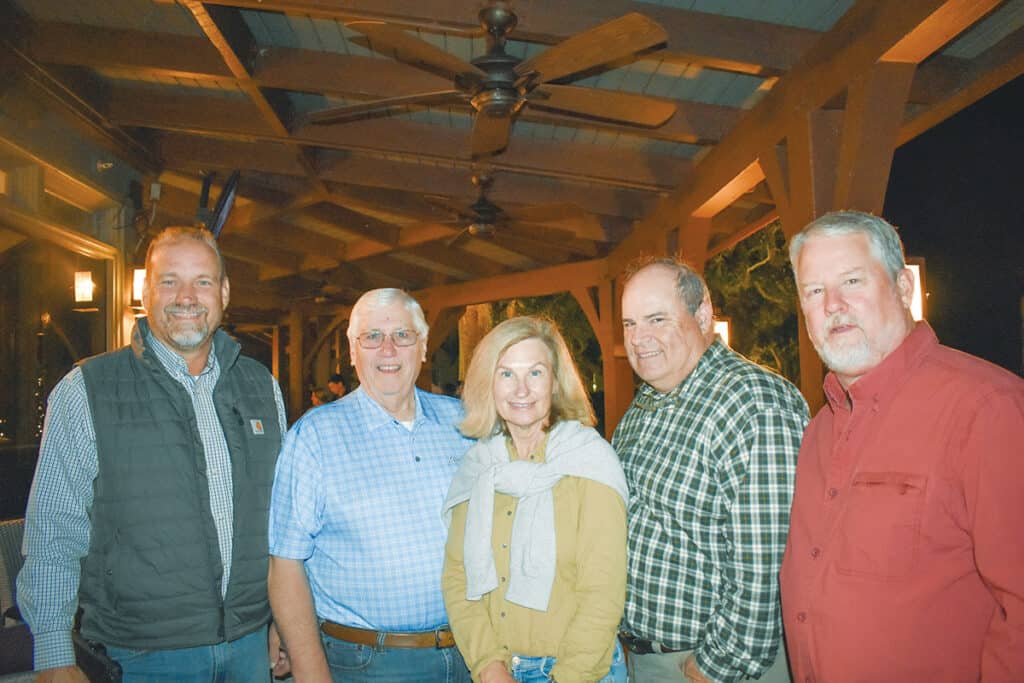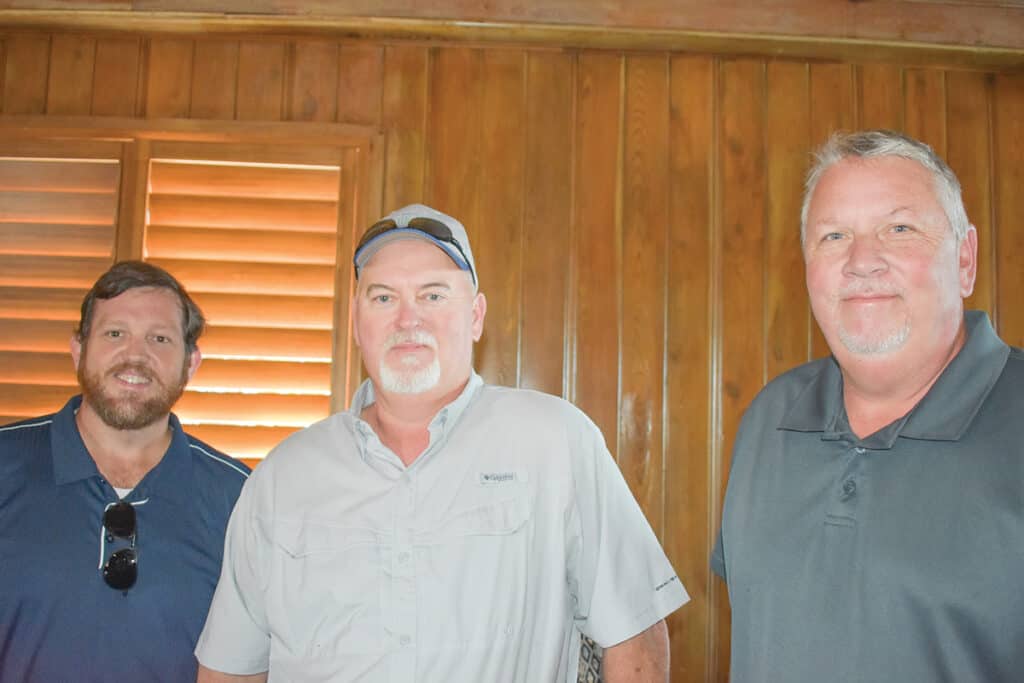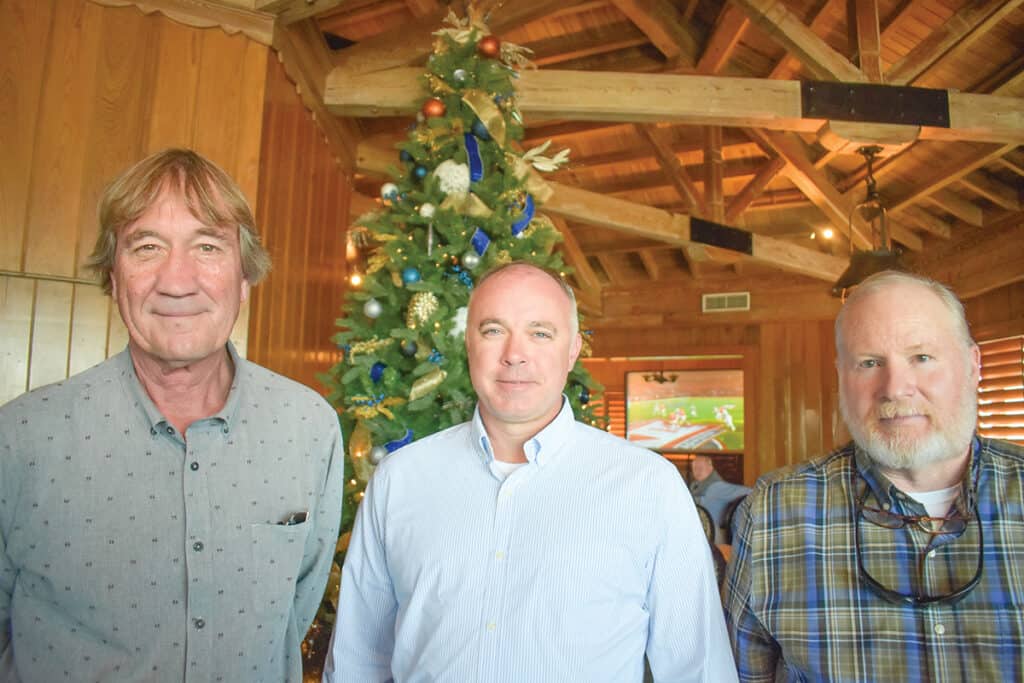Photos By Gary Miller
Point Clear, AL–Approximately 33 members and guests recently attended the annual Southwestern Hardwood Manufacturers Club (SWHMC) Christmas gathering, held here at Grand Hotel.
Attendees kicked off the event with a cocktail reception at Bucky’s Lounge, followed by a roundtable business discussion, which was attended by 25 lumbermen.
After that, all attendees were invited to the SEC Championship Tailgate Party in the Sky Lounge.
The day closed with a cocktail party hosted by Keith D. Peterson Insurance Company, also in the Sky Lounge.
The majority of those in attendance echoed the same opinions and sentiments heard for months throughout the industry, which include: challenges with transportation, labor and log availability. However, the concensus agreed that business is strong and the outlook for the coming year is good.
As one lumberman candidly defined the strength of the industry’s profit margins: “2020 was a record year for us and 2021 is probably going to be a great year for us, which we needed. Our concentration yard is doing really well. We have been able to find all the fiber that we want, overpaying for it, but getting it. We are seeing KD pricing come down and green pricing go up. So, the margins are starting to get squeezed a bit but they are still healthy enough to smile, just not to giggle about. We’ve grown business here in North America.”
A Mississippi lumberman said: “We’ve had a pretty good year in 2021 and 2020 was a good year. I am hearing that 2022 has some potential to continue that trend. We are busy as we can be.
“Business is booming and we pay $15 an hour for somebody to sweep the floor and then, you get somebody that knows how to read a tape measure, do a radius cut, put together a profile, put up P-Lam and solid surface and that is $25 to $35 an hour. So it is expensive to employ folks but you know, what are you going to do? I don’t care if it is insurance, milk, water, clothes, gas, a hotel room – it all costs more.”
Regarding employees, another attendee commented: “We have had trouble getting help just a little bit, but our boss just started paying all of us $300 a day – truck drivers, steer driving, knuckle boom driver, or whoever – $300 a day straight across the board to everyone.”
An Alabama lumber representative addressed the log/lumber situation and how it all impacts housing, stating: “From May to September in my part of the world, it was as wet as I have ever seen and I had probably more timber fall, other than one time in my life, in different tracts and different places. We couldn’t get to any of them and then, in October, I think that we had two to four weeks of logs under water. Then everything started drying up, things started moving and here we are today. I’ve got about 4-1/2 million feet of logs underwater, too many logs, and I don’t know what the hell to do. I probably need to start to sell some, but business is good. Business is really good. Regarding the flooring business… I can think of one other time in my life since 1999 that it has been this good. Recently I was at a meeting in Nashville and they had a National Association of Home Builders Economist giving a talk about housing and showing all these slides. It was almost like being in Alice in Wonderland because all the slides showed nothing but growth. We all heard that we are behind on building houses so I said, ‘I keep hearing we are behind on building houses and we have strong demand in the United States market; how long will it take us to catch up?’ He said, ‘It is going to take us 10 years to catch up.’ That’s like a million houses a year!”
He continued, “The logging is a problem in our area. Any kind of labor is a problem. We all have problems, but I’d rather have problems in this environment than problems that we had before we got to this point. So, I am extremely optimistic about this industry going forward, and I think we have a bright road ahead of us. We are still not at six million board feet or like that, and somebody said to me, ‘Well, heck, y’all could probably handle nine million.’ Well, tell me, where am I going to get the people? Also, if I order a piece of equipment today, a front-end loader or something like that, it is liable to be 12 months before I get it. I can’t get the people. I can’t get the machinery. I could probably get the raw material. I need to be running two shifts at my sawmill right now, but I can’t get enough people to do that.
“So, I don’t think even we in this industry can screw this one up and normally we do! Normally we out-produce any market we have ever been in. I just don’t think it can happen this time. I think we are going to have good business; we actually are going to have three to five years of growth.”
Another attendee exclaimed: “I can’t believe how good of a business we are in and how fast it got here. Everything for us has been in upper grades.”
Lumber representatives cited the typical domestic species as being strong sellers: White Oak, Poplar, Red Oak, Hickory, for example. Distribution/concentration yards and end use manufacturers were primary customers of many of those attendees.
In lower lumber grades, some attendees addressed the board road material and switch/cross tie markets. A Missouri rep said the crosstie business was very strong at the time of this meeting, as well as switch ties. His company sells them in 13-through-17-foot lengths.
Another representative whose company sells railroad ties said he had heard that a large railroad company in Canada was going to cut back their purchases of ties by 30 percent. All acknowledged that tariffs with Canada as well as overseas, particularly with China, placed pressure on many of these markets.
Regarding stave logs, an attendee noted: “Our market is really crazy and whatever logs we get, most of it is going to stave and customers have backed off on their grade. They used to get No. 1 Common logs and now they are getting the smaller sizes.”
Some equipment companies were representated at the SWHMC meeting too. A trend being noticed in the industry is one of automation to offset challenges presented by not being able to hire enough people to run the sawmills. One equipment representative stated: “Our business is good. We are about 13 or 14 months out on equipment orders and installations.”
Lastly, the insurance industry was also represented at this meeting. An attendee who represented one such firm, said: “The sawmill insurance niche is the same as it has been for the last three or four years, which is tough. It is supply and demand. The capacity is just not there like it was even five years ago. There are not as many insurance carriers in the market and the ones that are there have paid their share of losses because it has gotten expensive. But the good news is I think it is kind of planing out. I think the majority of people in it now are not naive to the market or not naive to the mills.”
Learn more about this club at www.swhmc.com.















